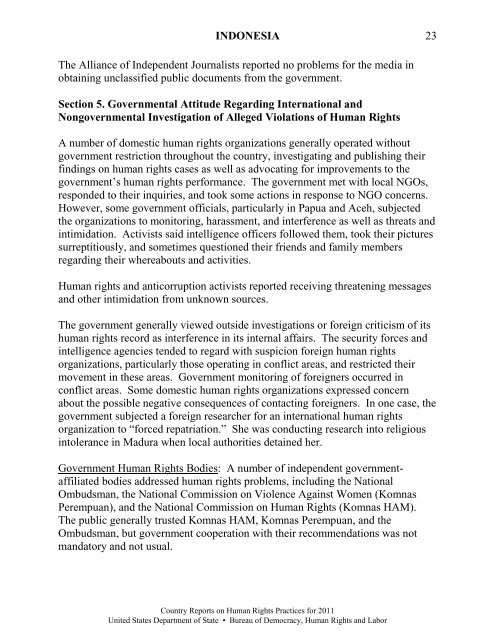INDONESIA EXECUTIVE SUMMARY Indonesia is a multiparty ...
INDONESIA EXECUTIVE SUMMARY Indonesia is a multiparty ...
INDONESIA EXECUTIVE SUMMARY Indonesia is a multiparty ...
Create successful ePaper yourself
Turn your PDF publications into a flip-book with our unique Google optimized e-Paper software.
<strong>INDONESIA</strong> 23<br />
The Alliance of Independent Journal<strong>is</strong>ts reported no problems for the media in<br />
obtaining unclassified public documents from the government.<br />
Section 5. Governmental Attitude Regarding International and<br />
Nongovernmental Investigation of Alleged Violations of Human Rights<br />
A number of domestic human rights organizations generally operated without<br />
government restriction throughout the country, investigating and publ<strong>is</strong>hing their<br />
findings on human rights cases as well as advocating for improvements to the<br />
government’s human rights performance. The government met with local NGOs,<br />
responded to their inquiries, and took some actions in response to NGO concerns.<br />
However, some government officials, particularly in Papua and Aceh, subjected<br />
the organizations to monitoring, harassment, and interference as well as threats and<br />
intimidation. Activ<strong>is</strong>ts said intelligence officers followed them, took their pictures<br />
surreptitiously, and sometimes questioned their friends and family members<br />
regarding their whereabouts and activities.<br />
Human rights and anticorruption activ<strong>is</strong>ts reported receiving threatening messages<br />
and other intimidation from unknown sources.<br />
The government generally viewed outside investigations or foreign critic<strong>is</strong>m of its<br />
human rights record as interference in its internal affairs. The security forces and<br />
intelligence agencies tended to regard with suspicion foreign human rights<br />
organizations, particularly those operating in conflict areas, and restricted their<br />
movement in these areas. Government monitoring of foreigners occurred in<br />
conflict areas. Some domestic human rights organizations expressed concern<br />
about the possible negative consequences of contacting foreigners. In one case, the<br />
government subjected a foreign researcher for an international human rights<br />
organization to “forced repatriation.” She was conducting research into religious<br />
intolerance in Madura when local authorities detained her.<br />
Government Human Rights Bodies: A number of independent governmentaffiliated<br />
bodies addressed human rights problems, including the National<br />
Ombudsman, the National Comm<strong>is</strong>sion on Violence Against Women (Komnas<br />
Perempuan), and the National Comm<strong>is</strong>sion on Human Rights (Komnas HAM).<br />
The public generally trusted Komnas HAM, Komnas Perempuan, and the<br />
Ombudsman, but government cooperation with their recommendations was not<br />
mandatory and not usual.<br />
Country Reports on Human Rights Practices for 2011<br />
United States Department of State • Bureau of Democracy, Human Rights and Labor
















